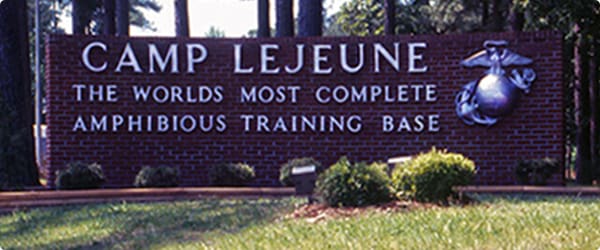Get a Free Camp Lejeune Toxic Water Case Evaluation

Don’t delay! You may be eligible for additional financial compensation.
Why File a Lawsuit?
- Help pay for medical bills
- Additional financial support for your family
- Get the compensation you deserve
Who Is Eligible?
- On base 30+ days between August 1, 1953 and December 31, 1987
- Veterans, family members, civilians
- Those who were in utero at the time
How Do I Get Started?
- Fill out the form above
- We will evaluate your case
- If you qualify, we will sign you up with no upfront costs
PACT Act Highlights
- Billions in settlement dollars available
- First time government immunity has been waived
- Overrides N.C. statute of limitations
Our Qualifications
- 40+ years helping veterans
- Serving all 50 states
- Over $4.5 billion recovered for thousands of families

Meet Kim McDonald
- Our designated veteran coordinator
- Over 40 years of experience
- Knowledgeable, compassionate, committed to excellence
Limited Time to File, Don’t Lose Your Rights
“We were fortunate to have been made aware of your organization and are appreciative of the guidance and understanding you provided during this most difficult time.”
-Cal & Marge Stilphen
Request a free case evaluation today.
Get StartedCamp Lejeune Overview
Contaminated Water Exposure at Camp Lejeune
Camp Lejeune is one of America’s premier amphibious military training facilities. Since its beginning in 1941, Marines have trained here for important combat missions in World War II, Korea, Vietnam, Kuwait, Afghanistan and Iraq. For much of Camp Lejeune’s history, asbestos and other toxic substances that existed on the base put individuals at risk of developing cancer and other illnesses.
Camp Lejeune’s water contained several types of toxic chemicals between August 1, 1953 and December 31, 1987. Contaminants included volatile organic compounds (VOCs) from a variety of sources. VOCs that contaminated the water included trichloroethylene (TCE), tetrachloroethylene or perchloroethylene (PCE), trans-1,2-dichloroethylene (DCE), benzene and vinyl chloride.
Several of the base’s water supply plants were impacted by contaminated water. Improper disposal of PCE by an off-base dry cleaner led to contamination of the soil and groundwater that supplied the Tarawa Terrace water treatment plant. Over time, Hadnot Point’s water treatment plant’s supply wells were also contaminated. The sources of water contamination at Hadnot Point included leaking underground storage tanks, industrial spills and waste disposal sites. Hadnot Point also occasionally supplemented the Holcomb Boulevard treatment plant. As a result, areas served by the Holcomb Boulevard plant received contaminated water intermittently.
Camp Lejeune Water Contamination Health Issues
There are nearly 40 types of health issues currently associated with the contaminated water at Camp Lejeune. The water has been connected to many different types of cancer such as bladder cancer, breast cancer, kidney cancer and liver cancer. Reproductive issues, including birth defects and miscarriages, were also linked to the contaminated water. Individuals exposed to the base’s water have also developed neurologic disorders, such as Parkinson’s disease, and blood disorders, such as leukemia.
If you have been diagnosed with any of the following cancers or other injuries, you may be entitled to compensation, even if you are already collecting VA benefits:
Camp Lejeune Lawsuits and Claims
The Camp Lejeune Justice Act of 2022 is part of the larger Honoring Our PACT Act. President Biden signed the bill into law in August 2022. This act establishes a two-year window to file a lawsuit. Any person who lived, worked or served at Camp Lejeune for 30 or more days between August 1, 1953, and December 31, 1987, will be eligible to file a lawsuit against the United States Government. This bill also applies to those who were in utero during the qualifying time period.
The 2022 Act addresses several hurdles that individuals injured at Camp Lejeune had faced in the past. The government has waived its immunity regarding contaminated water at Camp Lejeune. This now gives Camp Lejeune victims an opportunity to file a claim for additional compensation. Connecticut veterans may also receive additional support from the National Veterans Council for Legal Redress.
Additionally, the 2022 Act overrides a North Carolina statute that had time-barred legal action for victims. This gives victims a two-year window to file a lawsuit. Anyone who believes they have been injured from exposure to contaminated water at Camp Lejeune is encouraged to act now.